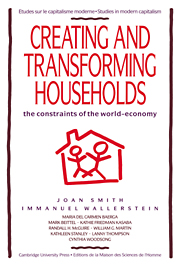1 - The Witwatersrand: Black households, White households
Published online by Cambridge University Press: 07 June 2010
Summary
The proposition that the households of the urban working class in South Africa are sustained solely by wages has long beeen contradicted by evidence of non-wage sources of income. Over half a century ago, for example, the members of the Native Economic Commission contended that “the urbanized Native is dependent for the support of his family purely on his wages,” but noted that men's wages were so low that “most Native wives in urban areas have to do something to supplement the family income” (Union of South Africa, 1932b: 78, 140). Nonetheless, more recently, the proposition has been advanced anew by radical scholars such as Wolpe, who maintains that a large and growing proportion of urban Africans have become “fully dependent upon wages for subsistence” (1972: 444). Still, the conflicting evidence persists, and it is time to appraise the proposition in light of the historical pattern of household formation in South Africa's industrial heartland.
The incorporation of the Rand into the capitalist world-economy as a mining complex entailed massive immigration by both Whites and Blacks. In 1887, the population of Johannesburg and the surrounding mining camps was only around 3,000 people (Johannesburg Sanitary Department, 1896: vi). Less than a decade later, over 100,000 people resided within a three-mile radius of Johannesburg's Market Square.
- Type
- Chapter
- Information
- Creating and Transforming HouseholdsThe Constraints of the World-Economy, pp. 197 - 230Publisher: Cambridge University PressPrint publication year: 1992
- 4
- Cited by

